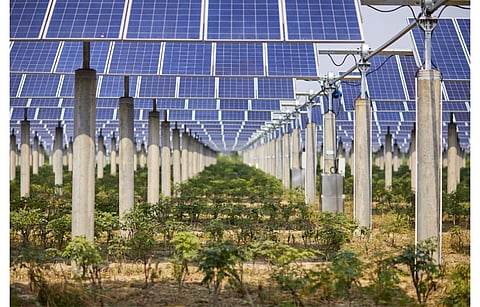

The US Department of Energy (DOE) is funding a survey that aims to explore the barriers to agrivoltaics to better understand the challenges facing farmers, solar developers and electric utilities for the dual use of farmland for PV.
The DOE is backing the Solar + Farms Survey through the Solar Energy Technologies Office's Foundational Agrivoltaic Research for Megawatt Scale (FARMS) program.
Launched by the Solar and Storage Industries Institute (SI2), the survey will collate information to provide farmers, developers, utilities, and policy makers with the resources necessary to assess agrivoltaic solutions.
Feedback collected through the survey regarding the experience and attitudes towards solar energy projects sited on farmland will be put together to understand the challenges and opportunities this PV application offers for food crops and livestock.
"The Solar + Farms Survey will enable farmers to share their experiences with agrivoltaics and learn more about the topic if they are not familiar with it," said SI2 Executive Director David Gahl.
SI2 is collaborating with the National Farmers Union (NFU), the National Rural Electric Cooperative Association (NRECA), and the Solar Energy Industries Association (SEIA) for the survey.
Currently, the country has more than 150 operational agrivoltaic sites and more are coming up. Recently, the German agrivoltaic specialist Next2Sun Mounting Systems GmbH announced plans to establish a vertical agrivoltaic plant in Vermont, US in partnership with US solar company iSun. Construction on site will begin in early 2024. The project is funded by the German Federal Ministry for Economic Affairs and Climate Action as part of the Renewable Energy Solutions Programme of the German Energy Solutions Initiative.
"Solar siting is one of the most difficult parts of deploying clean energy, and better collaboration with farmers will help us bridge the knowledge gap," said Senior Director of Research at SEIA, Shawn Rumery. "With a clearer understanding of the barriers facing stakeholders, we can begin to develop solutions to help further the deployment of agrivoltaic systems and address some of the solar siting challenges that persist today."
The US targets to transition to 100% clean electricity supply by 2035, and achieve net zero emissions by 2050, with solar energy playing a big role in it.
The government is making public land available through the Bureau of Land Management (BLM). BLM has prioritized roughly 870,000 acres exclusively for the development of solar energy projects out of the 245 million acres it manages for the US government. The SI2 survey should give some insights into making more land available for the US solar industry in a sustainable way.
The National Renewable Energy Laboratory (NREL) had earlier come out with 2 technical reports highlighting the potential for agrivoltaics in the US (see NREL Reports Highlight Potential For Agrivoltaics In US).
Interested respondents can take the online Solar + Farms Survey on SI2's website till April 9, 2024.
SI2 says the respondents have the option to remain anonymous. Aggregated results will ensure no single individual or company can be identified.
Alert to its potential, the European solar PV lobby association SolarPower Europe launched a best practices report for agrivoltaics in June 2023 to offer guidance for its sustainable deployment (see Expanding Agrivoltaics' Reach In Europe).
